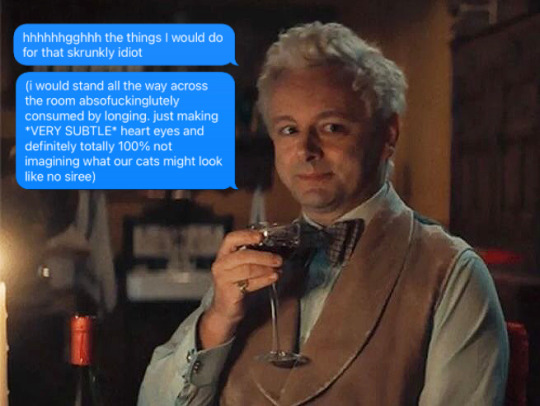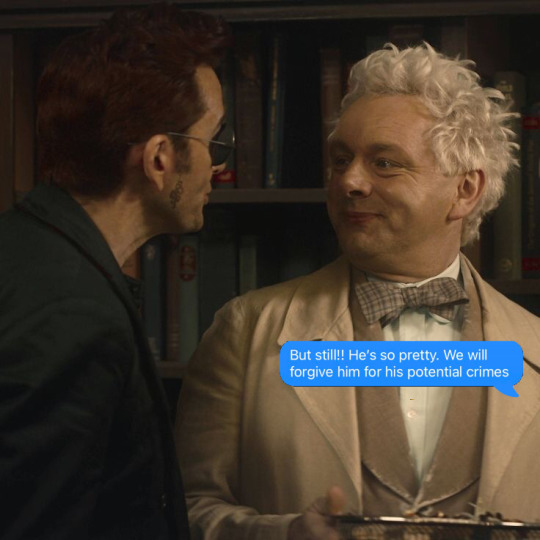#one for privacy
Text
thinking about that time I cried at a convention in like 2016/2017(?), during a panel, in front of everybody
then two people who were part of that panel noticed me the next year at that same convention
i can never live it down (<- i am the only person who thinks about it)
#i'm not telling you more#one for privacy#two bc i#i#my dad was in the crowd (cus he took me to the con) and then after the panel he asked me what media the whole panel was about#and like#wouldn't make any guesses just kept askign questions
1 note
·
View note
Text

I saw this on FB today and I wanna try and express something about it. Like, you know the curbcutter effect? Where when curbcuts are put in it benefits everyone (bicyclists, people with baby strollers etc) and not just disabled people?
There is also whatever the opposite of the curbcutter effect is. And this is that.
This isn't just anti-adhd/autism propaganda... this is anti-child propaganda.
Kids have developmentally appropriate ways that they need to move their bodies and express themselves and sitting perfectly still staring straight ahead is not natural or good for ANY CHILD.
Don't get me wrong, I was punished unduly as a kid for being neurodivergent (and other types of kid will ALSO be punished unduly for it... Black kids come to mind) and thus UNABLE to perform this -- but even the kids who ARE able to perform this type of behavior are not SERVED WELL by it. They don't benefit from it.
This is bad for everyone.
The idea that bc some kids may be capable of complying with unfair expectations, those expectations don't hurt them... is a dangerous idea. Compliance isn't thriving. Expectation of compliance isn't fair treatment.
#theres a lot of things lately that make me think of this where#people will act like theres this class of people not harmed by something#(laws undermining bodily autonomy come to mind!!!!!)#and its like -- no. the consequences will be worse for some people#but no one is ultimately served by the erosion of bodily autonomy like there is not a class of people who benefit from that#same with lack of right to privacy#there isnt a DEMOGRAPHIC of people who benefit from certain things#there are systems that do. and there may be a handful of individuals who benefit partially or FOR NOW#until those systems are turned against them#i think its important to remind people in certain privileged demographics that like#certain things do benefit them#and others DON'T#you may suffer less statistically but it doesnt benefit you!#its BAD SOCIETALLY.
46K notes
·
View notes
Text



















Party infighting
#dungeon meshi#aj art#chilchuck#tw sa implied#kind of#Also this is meant to be set before the griffin chapter so no one really gets why Senshi is having such a strong reaction lmao#That’s not important I just want people to know#Also it’s not really stated outright but the reason Chilchuck’s party feel so comfortable violating his privacy like that#While they think they’re being reasonable#Is bc Subconsciously they just don’t see him as an adult or even really a person#They didn’t intend to hurt him which is why they also felt so comfortable asking him to rejoin#From their perspective it was just an embarrassing situation#comic#Chilchuck backstory stuff
1K notes
·
View notes
Text



justice design concepts
#joy.jpg#anders#justice#justanders#dragon age#dragon age awakening#dragon age 2#dragon age origins#dao#daa#da2#art#fanart#artists on tumblr#digital art#clip studio paint#i think inviting someone else into your body permanently and doing away with any notion of privacy for the rest of your life is so intimate#you will never have a secret again. you will be entirely known to someone else. you will become their eyes their hands their home#and everything they know from that moment on will be colored by a lens of you. you are as inextricable as you are cherished#no one else will ever love you like that. no one else has the capacity to. is that okay?
539 notes
·
View notes
Text
Tim has found his soulmate (not a soulmate AU, just in the like “i think we’re totally meant to be together” way). Well, okay, it’s entirely one-sided so far, but he’s sure SpecterNova will reciprocate once they’re in proper contact.
He’s already found everything he publicly can on the youtuber, but he’s still digging deeper. It’s weirdly difficult—his love must like his privacy!—but he’s making headway.
On the other end, Danny is getting nervous about the dedication of his new internet stalker. Even with Tucker’s help in setting up his online security and the scrambling effects of ectoplasm, they can tell that the person is still making progress. They don’t seem like they’re a part of the GIW, but that doesn’t mean their search can’t harm him in some other way.
He really hopes he doesn’t have to change identities again. Having to do it the first time to flee the GIW was bad enough, and he’s been liking his current life.
#ONE SIDED dead tired ship#tim is suffering from a major parasocial relationship thing#i like tim but he’s getting thrown under the bus here#because i want to see more stories that condemn/portray negatively the stalker-y stuff that appears in a lot of batfam-x-other-person fics#and he seemed like a viable choice for internet obsessiveness#dp x dc#dc x dp#dpxdc#dcxdp#danny phantom x dc#danny phantom x dc crossover#youtuber danny fenton#or could be#streamer danny fenton#but i think the youtuber route makes more sense#because like it’d give him more room for privacy to keep off the GIW’s radar
742 notes
·
View notes
Text
@enderfore replied to your post “What do you think of Rook's savanaclaw card? <333”:
Chenya pic where???? I can barely see anything in that room there so much going on, rooks such a lil freak (affectionatr)
he's under the row of flags on Neige's side of the room, next to the big Neige poster with the yellow background (look just to the right of the hand holding the apple)! he's REAL little; once you know he's there you can kind of see him in-game, but I only noticed him in the first place because I took a screenshot and was having fun zooming in on all the details!

I think that's either Hop or Snick and Dominic on either side of Neige, but if the others are meant to be anyone in particular I don't recognize 'em. though I do love all the absolutely terrifying implications of Rook having this. was this some kind of officially-published merchandise (and if so, why) or did Rook like...go hunting through the RSA trash to find this random student lineup just because it included Neige, and has had it hanging proudly on the wall ever since. (I mean, he definitely did do this, I don't know why I'm asking. the real question is why he hasn't cut out little pictures of his own face and stuck them over everyone else's yet.)
there is seriously SO MUCH in this room. how did Rook manage to keep this hidden for three years. also, somebody give this background artist a raise immediately.
#screenshot#twisted wonderland#twisted wonderland spoilers#twisted wonderland episode 7 spoilers#twisted wonderland book 7 spoilers#twisted wonderland episode 7 part 8 spoilers#twisted wonderland book 7 part 8 spoilers#this just in: the savanaboys are canonically very respectful of each other's privacy and right to their own personal space#the other option is that no one actually wants to see why rook is always so desperate to keep people out of his room#but these are not mutually exclusive! leona respects your boundaries through genuinely not giving a shit. ⭐️#god. rook's room really was somehow exactly what i expected but also so much more than i could have ever imagined.#the literal divide down the center including his BEDSHEETS AND PILLOW#do you think rook makes sure to sleep precisely down to the mm in the center of his bed each night what am i saying of course he does#he has also probably trained his eyes to move independently so he can look at both of the hanging posters above his bed at once#savanarook really was such a treasure. i shall miss him.#(i have also decided based on basically nothing that because there's a banner with vil's unique magic name on it)#(and the corresponding banner for neige says '[someday my] prince will come')#(that i'm going to headcanon this as being neige's unique magic. i must know what it does. the possibilities are TANTALIZING)
752 notes
·
View notes
Text
Here's my controversial opinion; if you're trying to write Bruce as a non-abusive, good parent, you should also write him respecting his kids' privacy, boundaries, and not stalking&surveying them.
#my dc posting#dc#batfamily#batman#bruce wayne#dick grayson#jason todd#tim drake#damian wayne#looking thru ur kids phone tracking them giving them no privacy etc etc is deeply damaging#but yall aint ready for the ''stalking is their love language' is super toxic' conversation </3#also can we retire the JL being completely chill about it. 'batman just knows things' not being bothered their secret identities were found#out etc can we. stop coddling the batfam#i just need someone anytime to please just call them out like 'hey dont fucking surveil me' like that is actually extremely unethical#and its frankly not hard to write a batman who doesnt invade his kids privacy n boundaries etc#controversially when reading fic where theyre supposed to be healthy n getting along i want to actually feel like its deserved n good for t#hem#instead of sitting there going 'woo thats toxic' 'oh that even worse' 'why are we passing over all that'. like i dont wanna be thinkin they#should go no-contact when its supposed to be fuffy n good :(#like if you can write away the hitting n other abuse why is this the one thing that just must always stay#like genuinely it aint hard to write a parent not stalking their children. actually maybe i should remind you all that stalking is not good#or funny#like i feel like w all the joking some of us are actually forgetting its not good. ever. like absolutely never dont stalk ppl#eh idk. this is why i cant stay in any one fandom too long bc i start developing Opinions which inevitably make me hostile to like#90% of the fandom's content 😔
685 notes
·
View notes
Text
A student at Steve’s school, Amy, posts a Tiktok of her going around asking teachers questions. When they get to Steve, she asks, “Mr. Harrington, what’s the coolest thing you’ve ever done?”
Steve: I bowled a perfect game once.
Amy: That’s boring
Steve: I’m a boring guy
Lilly, heavy metal fan that’s been following Eddie since he made a Tiktok account: Weren’t you in a music video?
Steve, trying to remember if he was in a CC music video: …maybe?
Classroom: *explodes into questions*
#Eddie in the comments: You can see Steve’s foot in the video of Vecna’s Lament in the clip of Gareth running down the aisle of the tour bus#Eddie: We were making out in my bed#also Eddie in the comments: Coolest thing he’s ever done is save my life#if you watch the video you’ll see their dirty ass tour bus and then#the whitest sock you’ve ever seen sticking out of the privacy curtain on Eddie’s bed#Steve’s actually been in a few music videos very briefly but that’s the one Eddie choice to point out#eddie munson tiktok saga#steve harrington
343 notes
·
View notes
Text
Surveillance pricing

THIS WEEKEND (June 7–9), I'm in AMHERST, NEW YORK to keynote the 25th Annual Media Ecology Association Convention and accept the Neil Postman Award for Career Achievement in Public Intellectual Activity.

Correction, 7 June 2024: The initial version of this article erroneously described Jeffrey Roper as the founder of ATPCO. He benefited from ATPCO, but did not co-found it. The initial version of this article called ATPCO "an illegal airline price-fixing service"; while ATPCO provides information that the airlines use to set prices, it does not set prices itself, and while the DOJ investigated the company, they did not pursue a judgment declaring the service to be illegal. I regret the error.
Noted anti-capitalist agitator Adam Smith had it right: "People of the same trade seldom meet together, even for merriment and diversion, but the conversation ends in a conspiracy against the public, or in some contrivance to raise prices."
Despite being a raving commie loon, Smith's observation was so undeniably true that regulators, policymakers, and economists couldn't help but acknowledge that it was true. The trustbusting era was defined by this idea: if we let the number of companies in a sector get too small, or if we let one or a few companies get too big, they'll eventually start to rig prices.
What's more, once an industry contracts corporate gigantism, it will become too big to jail, able to outspend and overpower the regulators charged with reining in its cheating. Anyone who believes Smith's self-evident maxim had to accept its conclusion: that companies had to be kept smaller than the state that regulated them. This wasn't about "punishing bigness" – it was the necessary precondition for a functioning market economy.
We kept companies small for the same reason that we limited the height of skyscrapers: not because we opposed height, or failed to appreciate the value of a really good penthouse view – rather, to keep the building from falling over and wrecking all the adjacent buildings and the lives of the people inside them.
Starting in the neoliberal era – Carter, then Reagan – we changed our tune. We liked big business. A business that got big was doing something right. It was perverse to shut down our best companies. Instead, we'd simply ban big companies from rigging prices. This was called the "consumer welfare" theory of antitrust. It was a total failure.
40 years later, nearly every industry is dominated by a handful of companies, and these companies price-gouge us with abandon. Worse, they use their gigantic ripoff winnings to fill war-chests that fund the corruption of democracy, capturing regulators so that they can rip us off even more, while ignoring labor, privacy and environmental law and ducking taxes.
It turns out that keeping gigantic, opaque, complex corporations honest is really hard. They have so many ways to shuffle money around that it's nearly impossible to figure out what they're doing. Digitalization makes things a million times worse, because computers allow businesses to alter their processes so they operate differently for every customer, and even for every interaction.
This is Dieselgate times a billion: VW rigged its cars to detect when they were undergoing emissions testing and switch to a less polluting, more compliant mode. But when they were on the open road, they spewed lethal quantities of toxic gas, killing people by the thousands. Computers don't make corporate leaders more evil, but they let evil corporate leaders execute far more complex and nefarious plans. Digitalization is a corporate moral hazard, making it just too easy and tempting to rig the game.
That's why Toyota, the largest car-maker in the world, just did Dieselgate again, more than a decade later. Digitalization is a temptation no giant company can resist:
https://www.bbc.com/news/articles/c1wwj1p2wdyo
For forty years, pro-monopoly cheerleaders insisted that we could allow companies to grow to unimaginable scale and still prevent cheating. They passed rules banning companies from explicitly forming agreements to rig prices. About ten seconds later, new middlemen popped up offering "information brokerages" that helped companies rig prices without talking to one another.
Take Agri Stats: the country's hyperconcentrated meatpacking industry pays Agri Stats to "consult on prices." They provide Agri Stats with a list of their prices, and then Agri Stats suggests changes based on its analysis. What does that analysis consist of? Comparing the company's prices to its competitors, who are also Agri Stats customers:
https://pluralistic.net/2023/10/04/dont-let-your-meat-loaf/#meaty-beaty-big-and-bouncy
In other words, Agri Stats finds the highest price for each product in the sector, then "advises" all the companies with lower prices to raise their prices to the "competitive" level, creating a one-way ratchet that sends the price of food higher and higher.
More and more sectors have an Agri Stats, and digitalization has made this price-gouging system faster, more efficient, and accessible to sectors with less concentration. Landlords, for example, have tapped into Realpage, a "data broker" that the same thing to your rent that Agri Stats does to meat prices. Realpage requires the landlords who sign up for its service to accept its "recommendations" on minimum rents, ensuring that prices only go up:
https://popular.info/p/feds-raid-corporate-landlord-escalating
Writing for The American Prospect, Luke Goldstein lays out the many ways in which these digital intermediaries have supercharged the business of price-rigging:
https://prospect.org/economy/2024-06-05-three-algorithms-in-a-room/
Goldstein identifies a kind of patient zero for this ripoff epidemic: Jeffrey Roper, a former Alaska Air exec who benefited from a service that helps airlines set prices. ATPCO was investigated by the DOJ in the 1990s, but the enforcers lost their nerve and settled with the company, which agreed to apply some ornamental fig-leafs to its collusion-machine. Even those cosmetic changes were seemingly a bridge too far Roper, who left the US.
But he came back to serve as Realpage's "principal scientist" – the architect of a nationwide scheme to make rental housing vastly more expensive. For Roper, the barrier to low rents was empathy: landlords felt stirrings of shame when they made shelter unaffordable to working people. Roper called these people "idiots" who sentimentality "costs the whole system."
Sticking a rent-gouging computer between landlords and the people whose lives they ruin is a classic "accountability sink," as described in Dan Davies' new book "The Unaccountability Machine: Why Big Systems Make Terrible Decisions – and How The World Lost its Mind":
https://profilebooks.com/work/the-unaccountability-machine/
It's a form of "empiricism washing": if computers are working in the abstract realm of pure numbers, they're just moving the objective facts of the quantitative realm into the squishy, imperfect qualitative world. Davies' interview on Trashfuture is excellent:
https://trashfuturepodcast.podbean.com/e/fire-sale-at-the-accountability-store-feat-dan-davies/
To rig prices, an industry has to solve three problems: the problem of coming to an agreement to fix prices (economists call this "the collective action problem"); the problem of coming up with a price; and the problem of actually changing prices from moment to moment. This is the ripoff triangle, and like a triangle, it has many stable configurations.
The more concentrated an industry is, the easier it is to decide to rig prices. But if the industry has the benefit of digitalization, it can swap the flexibility and speed of computers for the low collective action costs from concentration. For example, grocers that switch to e-ink shelf tags can make instantaneous price-changes, meaning that every price change is less consequential – if sales fall off after a price-hike, the company can lower them again at the press of a button. That means they can collude less explicitly but still raise prices:
https://pluralistic.net/2024/03/26/glitchbread/#electronic-shelf-tags
My name for this digital flexibility is "twiddling." Businesses with digital back-ends can alter their "business logic" from second to second, and present different prices, payouts, rankings and other key parts of the deal to every supplier or customer they interact with:
https://pluralistic.net/2023/02/19/twiddler/
Not only does twiddling make it easier to rip off suppliers, workers and customers, it also makes these crimes harder to detect. Twiddling made Dieselgate possible, and it also underpinned "Greyball," Uber's secret strategy of refusing to send cars to pick up transportation regulators who would then be able to see firsthand how many laws the company was violating:
https://www.nytimes.com/2017/03/03/technology/uber-greyball-program-evade-authorities.html
Twiddling is so easy that it has brought price-fixing to smaller companies and less concentrated sectors, though the biggest companies still commit crimes on a scale that put these bit-players to shame. In The Prospect, David Dayen investigates the "personalized pricing" ripoff that has turned every transaction into a potential crime-scene:
https://prospect.org/economy/2024-06-04-one-person-one-price/
"Personalized pricing" is the idea that everything you buy should be priced based on analysis of commercial surveillance data that predicts the maximum amount you are willing to pay.
Proponents of this idea – like Harvard's Pricing Lab with its "Billion Prices Project" – insist that this isn't a way to rip you off. Instead, it lets companies lower prices for people who have less ability to pay:
https://thebillionpricesproject.com/
This kind of weaponized credulity is totally on-brand for the pro-monopoly revolution. It's the same wishful thinking that led regulators to encourage monopolies while insisting that it would be possible to prevent "bad" monopolies from raising prices. And, as with monopolies, "personalized pricing" leads to an overall increase in prices. In econspeak, it is a "transfer of wealth from consumer to the seller."
"Personalized pricing" is one of those cuddly euphemisms that should make the hair on the back of your neck stand up. A more apt name for this practice is surveillance pricing, because the "personalization" depends on the vast underground empire of nonconsensual data-harvesting, a gnarly hairball of ad-tech companies, data-brokers, and digital devices with built-in surveillance, from smart speakers to cars:
https://pluralistic.net/2024/03/12/market-failure/#car-wars
Much of this surveillance would be impractical, because no one wants their car, printer, speaker, watch, phone, or insulin-pump to spy on them. The flexibility of digital computers means that users always have the technical ability to change how these gadgets work, so they no longer spy on their users. But an explosion of IP law has made this kind of modification illegal:
https://locusmag.com/2020/09/cory-doctorow-ip/
This is why apps are ground zero for surveillance pricing. The web is an open platform, and web-browsers are legal to modify. The majority of web users have installed ad-blockers that interfere with the surveillance that makes surveillance pricing possible:
https://doc.searls.com/2023/11/11/how-is-the-worlds-biggest-boycott-doing/
But apps are a closed platform, and reverse-engineering and modifying an app is a literal felony – several felonies, in fact. An app is just a web-page skinned with enough IP to make it a felony to modify it to protect your consumer, privacy or labor rights:
https://pluralistic.net/2024/05/07/treacherous-computing/#rewilding-the-internet
(Google is leading a charge to turn the web into the kind of enshittifier's paradise that apps represent, blocking the use of privacy plugins and proposing changes to browser architecture that would allow them to felonize modifying a browser without permission:)
https://pluralistic.net/2023/08/02/self-incrimination/#wei-bai-bai
Apps are a twiddler's playground. Not only can they "customize" every interaction you have with them, but they can block you (or researchers seeking to help you) from recording and analyzing the app's activities. Worse: digital transactions are intimate, contained to the palm of your hand. The grocer whose e-ink shelf-tags flicker and reprice their offerings every few seconds can be collectively observed by people who are in the same place and can start a conversation about, say, whether to come back that night a throw a brick through the store's window to express their displeasure. A digital transaction is a lonely thing, atomized and intrinsically shielded from a public response.
That shielding is hugely important. The public hates surveillance pricing. Time and again, through all of American history, there have been massive and consequential revolts against the idea that every price should be different for every buyer. The Interstate Commerce Commission was founded after Grangers rose up against the rail companies' use of "personalized pricing" to gouge farmers.
Companies know this, which is why surveillance pricing happens in secret. Over and over, every day, you are being gouged through surveillance pricing. The sellers you interact with won't tell you about it, so to root out this practice, we have to look at the B2B sales-pitches from the companies that sell twiddling tools.
One of these companies is Plexure, partly owned by McDonald's, which provides the surveillance-pricing back-ends for McD's, Ikea, 7-Eleven, White Castle and others – basically, any time a company gives you a hard-sell to order via its apps rather than its storefronts or its website, you should assume you're getting twiddled, hard.
These companies use the enshittification playbook to trap you into using their apps. First, they offer discounts to customers who order through their apps – then, once the customers are fully committed to shopping via app, they introduce surveillance pricing and start to jack up the prices.
For example, Plexure boasts that it can predict what day a given customer is getting paid on and use that information to raise prices on all the goods the customer shops for on that day, on the assumption that you're willing to pay more when you've got a healthy bank balance.
The surveillance pricing industry represents another reason for everything you use to spy on you – any data your "smart" TV or Nest thermostat or Ring doorbell can steal from you can be readily monetized – just sell it to a surveillance pricing company, which will use it to figure out how to charge you more for everything you buy, from rent to Happy Meals.
But the vast market for surveillance data is also a potential weakness for the industry. Put frankly: the commercial surveillance industry has a lot of enemies. The only thing it has going for it is that so many of these enemies don't know that what's they're really upset about is surveillance.
Some people are upset because they think Facebook made Grampy into a Qanon. Others, because they think Insta gave their kid anorexia. Some think Tiktok is brainwashing millennials into quoting Osama bin Laden. Some are upset because the cops use Google location data to round up Black Lives Matter protesters, or Jan 6 insurrectionists. Some are angry about deepfake porn. Some are angry because Black people are targeted with ads for overpriced loans or colleges:
https://www.theregister.com/2024/06/04/meta_ad_algorithm_discrimination/
And some people are angry because surveillance feeds surveillance pricing. The thing is, whatever else all these people are angry about, they're all angry about surveillance. Are you angry that ad-tech is stealing a 51% share of news revenue? You're actually angry about surveillance. Are you angry that "AI" is being used to automatically reject resumes on racial, age or gender grounds? You're actually angry about surveillance.
There's a very useful analogy here to the history of the ecology movement. As James Boyle has long said, before the term "ecology" came along, there were people who cared about a lot of issues that seemed unconnected. You care about owls, I care about the ozone layer. What's the connection between charismatic nocturnal avians and the gaseous composition of the upper atmosphere? The term ecology took a thousand issues and welded them together into one movement.
That's what's on the horizon for privacy. The US hasn't had a new federal consumer privacy law since 1988, when Congress acted to ban video-store clerks from telling the newspapers what VHS cassettes you were renting:
https://en.wikipedia.org/wiki/Video_Privacy_Protection_Act
We are desperately overdue for a new consumer privacy law, but every time this comes up, the pro-surveillance coalition defeats the effort. but as people who care about conspiratorialism, kids' mental health, spying by foreign adversaries, phishing and fraud, and surveillance pricing all come together, they will be an unbeatable coalition:
https://pluralistic.net/2023/12/06/privacy-first/#but-not-just-privacy
Meanwhile, the US government is actually starting to take on these ripoff artists. The FTC is working to shut down data-brokers:
https://pluralistic.net/2023/08/16/the-second-best-time-is-now/#the-point-of-a-system-is-what-it-does
The FBI is raiding landlords to build a case against Frontpage and other rent price-fixers:
https://popular.info/p/feds-raid-corporate-landlord-escalating
Agri Stats is facing a DoJ lawsuit:
https://www.nationalhogfarmer.com/market-news/agri-stats-loses-motions-to-transfer-dismiss-in-doj-antitrust-case
Not every federal agency has gotten the message, though. Trump's Fed Chairman, Jerome Powell – whom Biden kept on the job – has been hiking interest rates in a bid to reduce our purchasing power by making millions of Americans poorer and/or unemployed. He's doing this to fight inflation, on the theory that inflation is being cause by us being too well-off, and therefore trying to buy more goods than are for sale.
But of course, interest rates are inflationary: when interest rates go up, it gets more expensive to pay your credit card bills, lease your car, and pay a mortgage. And where we see the price of goods shooting up, there's abundant evidence that this is the result of greedflation – companies jacking up their prices and blaming inflation. Interest rate hawks say that greedflation is impossible: if one company raises its prices, its competitors will swoop in and steal their customers with lower prices.
Maybe they would do that – if they didn't have a toolbox full of algorithmic twiddling options and a deep trove of surveillance data that let them all raise prices together:
https://prospect.org/blogs-and-newsletters/tap/2024-06-05-time-for-fed-to-meet-ftc/
Someone needs to read some Adam Smith to Chairman Powell: "People of the same trade seldom meet together, even for merriment and diversion, but the conversation ends in a conspiracy against the public, or in some contrivance to raise prices."

If you'd like an essay-formatted version of this post to read or share, here's a link to it on pluralistic.net, my surveillance-free, ad-free, tracker-free blog:
https://pluralistic.net/2024/06/05/your-price-named/#privacy-first-again

Image:
Cryteria (modified)
https://commons.wikimedia.org/wiki/File:HAL9000.svg
CC BY 3.0
https://creativecommons.org/licenses/by/3.0/deed.en
#pluralistic#david dayen#the american prospect#surveillance advertising#commercial surveillance#predictive pricing#monopolism#monopolies#antitrust#unfair and deceptive method of competition#ftc act Section 5#ftca5#ripoffs#surveillance#twiddling#ip#apps#apps are shit#ziprecruiter#personalized pricing#price gouging#just and reasonable#interstate commerce act#one person one price#surveillance pricing#privacy first#billion prices project#ecommerce#ninetailed#cortado group
420 notes
·
View notes
Text
another photo shared by the fan who met ewan mitchell recently + answering questions.


#hotd s2#hotd#house of the dragon#tv shows#aemond targaryen#ewan mitchell#aemond one eye#prince aemond targaryen#fans#fan interactions#hotd cast#actors#tiktok comments#i really appreciate that there are still fans who respect the privacy of actors#i love that there are fans who protect ewan mitchell because he is a true gem!!
269 notes
·
View notes
Text
Wayne Manor (always sentient if I have a say) probably has architectural and old-magic ways of distracting or confusing intruders that aren't supposed to be there. You enter a room, searching for something, and decide to explore further, but it takes you ages to realize you've left and re-entered the same room. Bruce used to vanish completely playing hide and seek, and Martha used to spend confused hours trying to find him, half-convinced she'd already looked everywhere, yet still managing to just barely miss him. Forget finding the Cave, even finding the nearest bathroom is near impossible if you did something the house doesn't like.
It also loves Alfred, so it permanently prevents him from leaving.
#Catwoman tried robbing the place only once before the terror of honestly being stuck prevented her from returning#Alfred tries to keep guests confined to one part of the house#he cites privacy but he actually does headcounts to make sure the same number of people that entered exit (occasionally there's extras)#batman#dc comics#bruce wayne#wayne manor#eldritch gotham
488 notes
·
View notes
Text

can i get a kiss?
and can you make it last forever?
i got emotional listening to See You Again by tyler, the creator. i thought of how long mario and peach have been a part of each other’s lives, and so i wanted to paint one of their very first romantic moments. painting in the N64 style was TONS of fun!
#smb#mario#peach#mareach#no id#giddly’s art#rip to that one toad whose head i deleted out of this frame for the sake of giving them some privacy lmao#btw i initially did a simple trace over the screenshot in order to block out the shapes#then i freehanded the rendering and the background
250 notes
·
View notes
Text







a hastily thrown-together good omens shitpost made with my actual real life text message conversations
(here’s part 2)
#imagine wlw says ‘angel’. I’m a lesbian and I’m too lazy to try and make that one work lol#I didn’t want to include too much of other ppl’s responses to my messages bc privacy but yeah#anyway true story I literally asked this girl (my best friend whom I was in love with) to run away with me#like as a joke (but tbh I would have probably done anything she asked me to lmaoo)#and she was like yeah!!! then she ghosted me like 2 weeks later :)#aksjksjdkdj#metatron one doesn’t rly fit but whatever#good omens 2#good omens#aziraphale#aziracrow#ineffable husbands#crowley#ineffable lovers#go2#ineffable wives#good omens season 2#good omens shitpost#shitpost#good omens tv#David tennant#Michael sheen#the metatron#ineffable divorce#ineffable dumbasses#ineffable idiots
777 notes
·
View notes
Text
my absolute favourite favourite favourite trope in fanfic is when thorin is outwardly a grouchy, ill tempered scowling dwarf whom bilbo just silently watches from afar lamenting the fact that someone like That would never give someone like Him the time of day-
and then the perspective shifts to thorin and we get to just listen to this smitten fool plan out their wedding in extreme detail all while waxing poetry about the sunlight shining through bilbo’s curls in his mind i just,,
#I EAT THAT SHIT UP EVERY TIME#THORIN CALLING BILBO PET NAMES IN THE PRIVACY OF HIS OWN MIND??? HELL YES#THORIN ACCIDENTALLY SLIPPING UP AND SPEAKING ONE OF THEM ALOUD EITHER IN TIMES OF DURESS OR WHEN BILBO JUST LOOKED TOO PRETTY??? HAND IT OVE#I WOULD DIE FOR IT#idk what that trope is even called#but i love it dearly#the hobbit#lotr#thorin oakenshield#bagginshield#bilbo baggins#lord of the rings#thilbo#fanfic tropes
1K notes
·
View notes
Text




Sketches!
#I swear I sketch#I just been not posting them#partly because I’m in that weird ‘wow this sucks ass’ phase#with like everything I draw#trying to feel better ahhhh#anyways#the last two I erased the other artists doodles (exception of the first one) for the other artists privacy#doodles#art#my art#mortal kombat#mortal kombat 1#kung Lao#mk1 raiden#mavado
245 notes
·
View notes
Text

the face of a man whose entire inner monologue is currently 'elim when will you learn that this is always always what happens when you think with your ajan'


"I can't believe I'm going to die surrounded by subpar human interior design and didn't even get laid for it. maybe Tain was right after all"
#star trek#star trek ds9#ds9#garashir#elim garak#funniest part of the episode for me was when he loudly went 'I'd give you two some privacy if I could'#while VERY obviously keeping his eyes laser focused on julian making out with someone the whole time#I don't think garak has any dignity left on this whatsoever he'll settle for the merest scraps fhdskaj I feel so bad for him help this man#shoutout to avery brooks for chewing the scenery in the background. when no one's got me etc.
323 notes
·
View notes